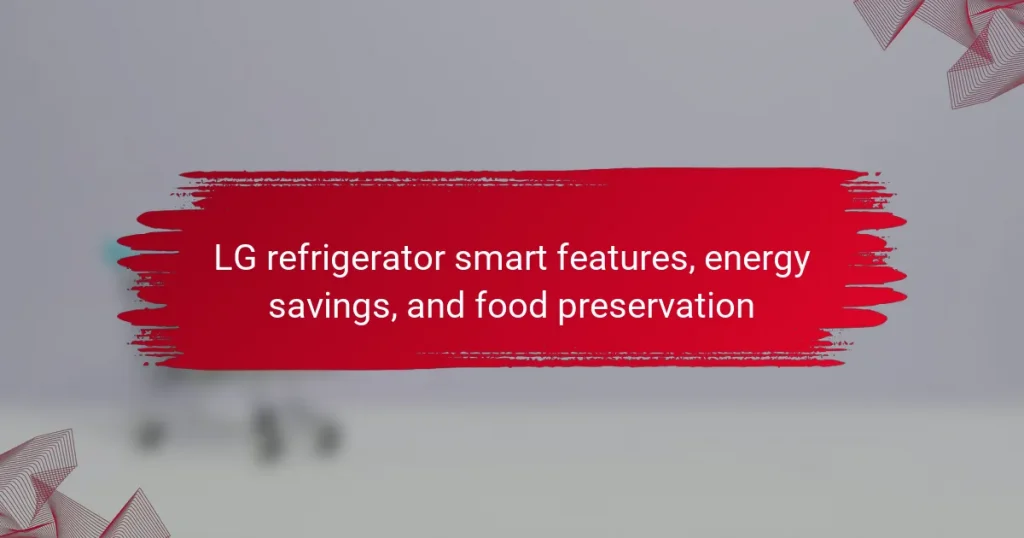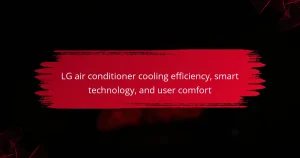LG refrigerators incorporate advanced smart technology designed to enhance convenience, efficiency, and food preservation. Key features include Wi-Fi connectivity for remote monitoring, voice assistant compatibility for hands-free operation, and the Smart Diagnosis system for quick troubleshooting. These models utilize inverter linear compressors and smart sensors to optimize energy consumption, contributing to significant energy savings. Additionally, LG’s Freshness features, such as humidity-controlled crispers and Multi Air Flow systems, help maintain optimal conditions for food storage, while UVnano technology reduces bacteria on water dispensers, ensuring safer food storage. Together, these innovations significantly improve the longevity and quality of stored food.
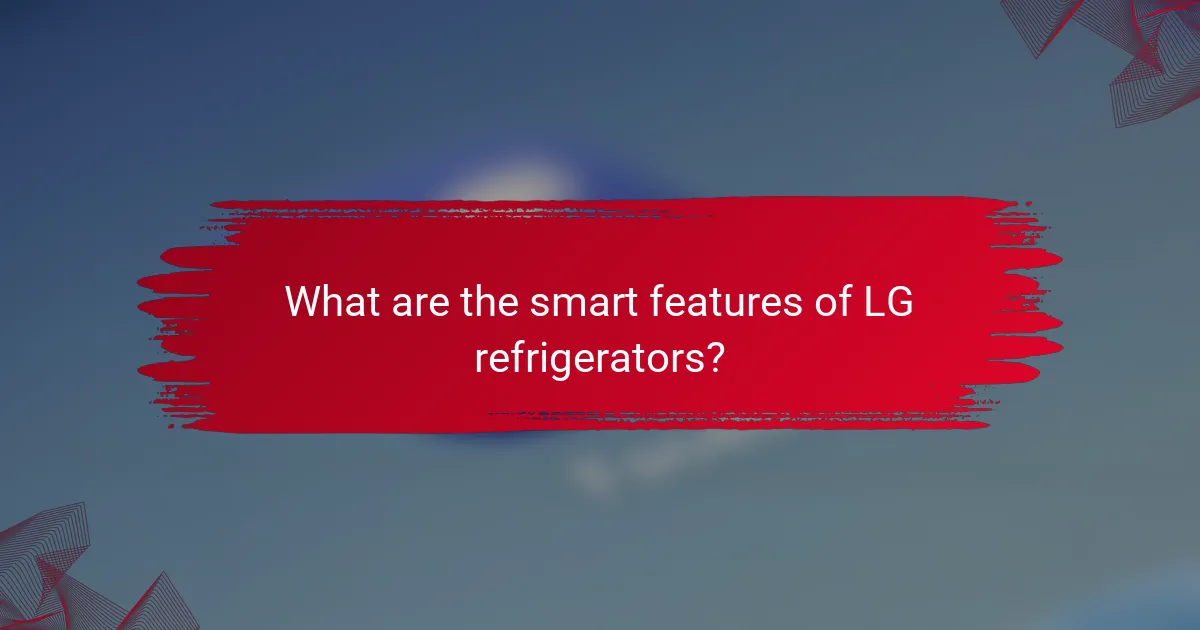
What are the smart features of LG refrigerators?
LG refrigerators feature advanced smart technology for enhanced convenience and efficiency. These models include Wi-Fi connectivity for remote monitoring and control via a smartphone app. They also offer voice assistant compatibility, allowing users to manage settings through voice commands. The Smart Diagnosis feature helps troubleshoot issues quickly, providing solutions via the app. Additionally, some models have a door-in-door feature for easy access to frequently used items. LG refrigerators often include a smart cooling system that maintains optimal temperatures for food preservation. These features contribute to energy savings by optimizing performance and reducing waste.
How do LG refrigerator smart features enhance user convenience?
LG refrigerator smart features enhance user convenience by providing advanced technology for easier management of food storage. These features include smart diagnosis, which allows users to troubleshoot issues via a smartphone app. Additionally, the smart inverter compressor adjusts cooling based on usage patterns, optimizing energy efficiency. The door-in-door feature provides quick access to frequently used items, reducing cold air loss. Smart connectivity enables remote temperature adjustments and inventory tracking through mobile devices. In 2021, LG refrigerators received high ratings for user-friendly interfaces and energy-saving capabilities, further proving their convenience.
What specific technologies are integrated into LG’s smart features?
LG’s smart features integrate several specific technologies. These include SmartThinQ technology, which allows remote control via a mobile app. Inverter Linear Compressor technology enhances energy efficiency and temperature control. Smart Diagnosis enables quick troubleshooting through a smartphone. Additionally, LG’s refrigerator features a Door-in-Door design for easy access and organization. These technologies collectively improve user convenience and energy savings.
How does connectivity improve the functionality of LG refrigerators?
Connectivity enhances the functionality of LG refrigerators by enabling remote monitoring and control. Users can adjust temperature settings from their smartphones, ensuring optimal food preservation. Connectivity allows for real-time alerts about door openings or temperature fluctuations. This feature helps prevent spoilage and waste. Additionally, LG refrigerators can receive software updates remotely, improving performance and adding new features. Integration with smart home systems allows for seamless operation with other devices. These capabilities lead to increased energy efficiency and convenience for users. Overall, connectivity significantly elevates the user experience and functionality of LG refrigerators.
What role do LG refrigerator smart features play in food preservation?
LG refrigerator smart features enhance food preservation by optimizing temperature and humidity levels. These features include smart sensors that monitor internal conditions in real-time. They adjust settings automatically to maintain ideal storage environments. For example, the Smart Diagnosis feature allows users to troubleshoot issues quickly. This minimizes temperature fluctuations that can spoil food. Additionally, the Door-in-Door feature reduces cold air loss when accessing frequently used items. Studies show that maintaining consistent temperatures can extend the freshness of produce. Overall, LG’s smart technology plays a crucial role in prolonging food shelf life.
How do smart sensors contribute to optimal food storage conditions?
Smart sensors contribute to optimal food storage conditions by monitoring temperature and humidity levels in real-time. They ensure that food is stored at the ideal conditions to prolong freshness. These sensors can detect fluctuations and automatically adjust settings accordingly. For example, if the temperature rises, the refrigerator can cool down promptly. Studies indicate that maintaining consistent temperatures can reduce food spoilage by up to 30%. Additionally, smart sensors can send alerts to users about potential issues, allowing for proactive management of food storage. This technology enhances food safety and minimizes waste effectively.
What alerts and notifications do LG refrigerators provide for food management?
LG refrigerators provide alerts and notifications for food management through various smart features. These refrigerators can send notifications about temperature changes, door openings, and filter replacements. For example, if the door is left open, an alert is triggered to prevent food spoilage. Additionally, some models offer reminders for expiration dates of stored items. These features help users manage their food efficiently and reduce waste. The notifications can be accessed via smartphone apps, enhancing user convenience.
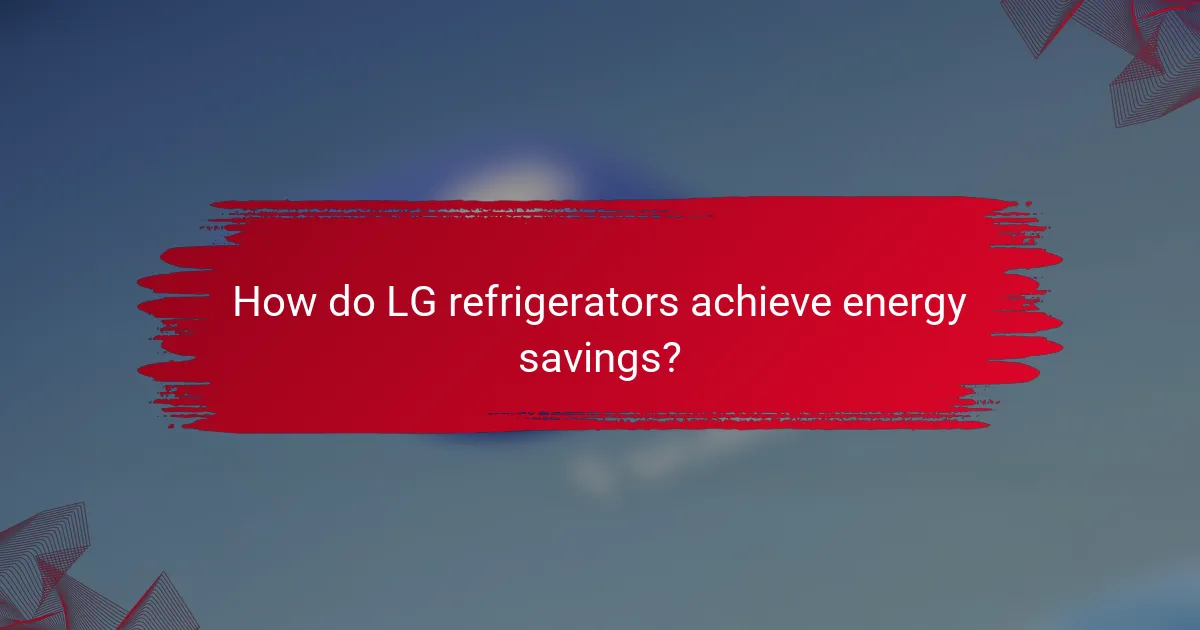
How do LG refrigerators achieve energy savings?
LG refrigerators achieve energy savings through advanced technologies and efficient designs. They utilize inverter linear compressors that adjust cooling power based on demand. This results in less energy consumption compared to traditional compressors. Additionally, LG refrigerators feature smart sensors that monitor temperature and humidity levels. These sensors optimize cooling cycles, further reducing energy use. The energy-efficient LED lighting also contributes to lower electricity consumption. According to Energy Star ratings, many LG models exceed standard energy efficiency requirements. This combination of features leads to significant energy savings over time.
What energy-efficient technologies are utilized in LG refrigerators?
LG refrigerators utilize several energy-efficient technologies. These include Inverter Linear Compressor technology, which adjusts cooling power based on internal temperature fluctuations. This technology reduces energy consumption by up to 32% compared to traditional compressors.
Additionally, LG employs Smart Diagnosis, allowing users to troubleshoot issues via a smartphone app. This feature minimizes unnecessary service calls and energy waste.
Another technology is the Door-in-Door feature, which reduces cold air loss by allowing easy access to frequently used items. This design helps maintain internal temperature, further enhancing energy efficiency.
Lastly, LG refrigerators often feature LED lighting, which consumes less energy than traditional bulbs while providing better visibility. These combined technologies contribute to LG’s commitment to energy efficiency and sustainability.
How does inverter technology impact energy consumption?
Inverter technology significantly reduces energy consumption in appliances. It achieves this by adjusting the compressor speed based on cooling demand. Traditional compressors operate at fixed speeds, leading to energy wastage during non-peak times. In contrast, inverter compressors maintain optimal temperatures with minimal energy use. Studies show that inverter technology can lead to energy savings of 30-50% compared to non-inverter models. This efficiency not only lowers electricity bills but also decreases the overall carbon footprint of the appliance.
What is the significance of energy star ratings for LG refrigerators?
Energy Star ratings for LG refrigerators indicate energy efficiency. These ratings help consumers identify appliances that consume less energy. Energy-efficient refrigerators can significantly reduce electricity bills. According to the U.S. Department of Energy, Energy Star appliances use about 10-50% less energy than standard models. This efficiency also reduces greenhouse gas emissions. LG refrigerators with Energy Star ratings often feature advanced cooling technologies. These technologies enhance food preservation while minimizing energy use. Overall, Energy Star ratings provide assurance of both performance and sustainability.
How can users maximize energy savings with LG refrigerators?
Users can maximize energy savings with LG refrigerators by utilizing energy-efficient settings and features. Setting the refrigerator temperature between 37°F and 40°F optimizes cooling without excessive energy use. Users should also keep the refrigerator and freezer full, as a full unit retains cold better than an empty one. Regularly cleaning the condenser coils improves efficiency by allowing better heat exchange. Users can take advantage of the Smart Diagnosis feature to troubleshoot issues that may affect energy consumption. Additionally, utilizing the Energy Saver mode reduces energy usage during non-peak hours. According to the U.S. Department of Energy, maintaining proper airflow around the refrigerator also aids in energy efficiency. Implementing these practices can lead to significant energy savings over time.
What best practices should users follow for energy-efficient operation?
Users should maintain optimal temperatures in their LG refrigerator for energy-efficient operation. The recommended temperature is 37°F for the refrigerator and 0°F for the freezer. Regularly check and clean the condenser coils to ensure efficient cooling. Keeping the refrigerator full but not overcrowded helps maintain temperature stability. Users should avoid placing hot food directly into the fridge, as this increases energy consumption. Closing the refrigerator door promptly minimizes energy loss. Using the energy-saving mode, if available, can enhance efficiency. Regularly inspecting door seals ensures they are airtight, preventing cool air from escaping. Following these practices can lead to significant energy savings and prolonged appliance lifespan.
How does proper maintenance influence energy efficiency?
Proper maintenance significantly enhances energy efficiency in appliances like LG refrigerators. Regular cleaning of coils prevents dust buildup, which can impede heat exchange. This allows the refrigerator to operate more efficiently. Checking door seals ensures they are airtight, preventing cold air from escaping. This reduces the workload on the compressor. Additionally, maintaining optimal temperature settings can prevent excessive energy consumption. According to the U.S. Department of Energy, properly maintained appliances can operate up to 15% more efficiently. Regular maintenance ultimately leads to lower energy bills and prolonged appliance lifespan.
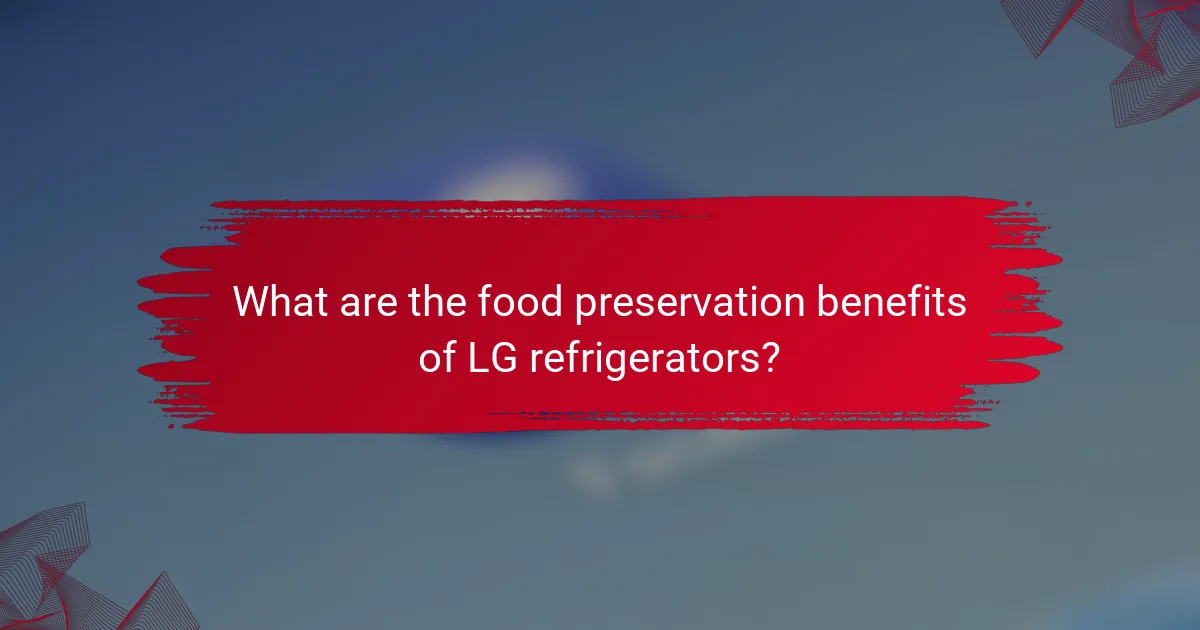
What are the food preservation benefits of LG refrigerators?
LG refrigerators provide advanced food preservation benefits through technologies like Smart Diagnosis and Linear Compressor. Smart Diagnosis allows quick troubleshooting, ensuring optimal performance. The Linear Compressor maintains a consistent temperature, reducing fluctuations that can spoil food.
LG’s Freshness features, such as humidity-controlled crispers, help keep fruits and vegetables fresher for longer. The Multi Air Flow system ensures even cooling throughout the refrigerator. This technology minimizes temperature variations, which can lead to food spoilage.
Additionally, LG refrigerators often include UVnano technology that reduces bacteria on water dispensers. This feature contributes to safer food storage by maintaining cleaner conditions. Together, these innovations enhance food longevity and quality.
How do LG refrigerators maintain optimal humidity and temperature levels?
LG refrigerators maintain optimal humidity and temperature levels through advanced technology and design features. They utilize a linear compressor that adjusts cooling power based on the internal temperature. This ensures consistent cooling and minimizes temperature fluctuations.
Additionally, LG refrigerators are equipped with humidity-controlled crispers. These drawers regulate moisture levels, keeping fruits and vegetables fresh longer. The SmartThinQ technology allows users to monitor and adjust settings remotely for optimal performance.
Furthermore, LG models often include multi-air flow systems. These systems circulate cool air throughout the refrigerator to maintain even temperatures. The combination of these features helps preserve food quality and reduce spoilage.
What unique features support long-term food freshness?
Unique features that support long-term food freshness in LG refrigerators include advanced cooling technology and humidity control systems. Advanced cooling technology maintains a consistent temperature, reducing temperature fluctuations that can spoil food. Humidity control systems regulate moisture levels, preventing excess moisture that can lead to mold and spoilage.
Additionally, the Smart Diagnosis feature allows for quick troubleshooting, ensuring the refrigerator operates efficiently. The Linear Compressor technology minimizes energy consumption while maximizing cooling performance. These features collectively enhance food preservation, extending the shelf life of perishable items.
How do different compartments cater to various food types?
Different compartments in LG refrigerators are designed to cater to various food types by optimizing temperature and humidity levels. The crisper drawer maintains higher humidity for fruits and vegetables, preserving their freshness. The meat and fish compartment operates at a lower temperature, ensuring optimal storage conditions for proteins. The dairy compartment is slightly warmer, suited for cheese and butter. Additionally, adjustable shelves allow for customized spacing, accommodating taller items. These specialized compartments enhance food preservation and reduce spoilage. Studies indicate that maintaining proper storage conditions can extend the shelf life of food by up to 50%.
What tips can enhance food preservation in LG refrigerators?
To enhance food preservation in LG refrigerators, maintain proper temperature settings. The ideal temperature for refrigeration is between 32°F and 40°F. Regularly check and adjust the temperature settings to ensure optimal conditions. Utilize the Fresh Air Filter to minimize odors and maintain air quality. Keep the refrigerator organized to allow for proper air circulation. Store food in airtight containers to prevent moisture loss and contamination. Avoid overloading the refrigerator, as this can restrict airflow. Regularly clean the condenser coils to improve efficiency and cooling performance. Lastly, utilize the Smart Diagnosis feature for troubleshooting issues that may affect food preservation.
How should food be organized for maximum freshness?
Food should be organized in the refrigerator by grouping similar items together and utilizing designated zones. This practice helps maintain optimal temperatures for different types of food. For instance, store dairy products on the top shelves, where temperatures are more consistent. Place raw meats on the bottom shelf to prevent cross-contamination. Keep fruits and vegetables in their respective crisper drawers to control humidity levels. Additionally, avoid overpacking the fridge to ensure proper air circulation. Research indicates that proper organization can extend the shelf life of perishable items by up to 25%.
What common mistakes should be avoided in food storage?
Common mistakes in food storage include not sealing food properly, which can lead to contamination. Failing to label food items can result in forgetting their storage dates. Overcrowding the refrigerator prevents proper air circulation, affecting temperature stability. Storing food in inappropriate containers can result in spoilage or freezer burn. Not checking the temperature settings regularly can lead to unsafe storage conditions. Keeping food near the refrigerator door exposes it to temperature fluctuations. Finally, ignoring expiration dates can lead to consuming spoiled food. These mistakes can significantly compromise food safety and quality.
LG refrigerators are equipped with advanced smart features that enhance convenience, energy savings, and food preservation. Key technologies include Wi-Fi connectivity for remote control, Smart Diagnosis for troubleshooting, and a smart cooling system that maintains optimal temperatures. The article covers how these features improve user experience, reduce energy consumption, and prolong food freshness through specialized compartments and humidity control. Additionally, it highlights best practices for maximizing energy efficiency and maintaining food quality in LG refrigerators.
